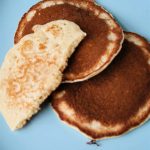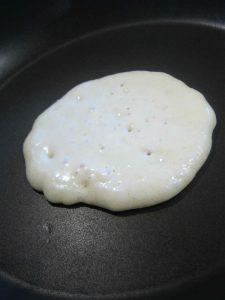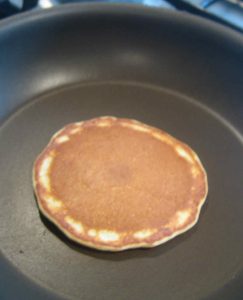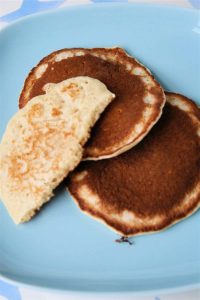Basic Scotch Pancake Recipe
How to make classic Scotch pancakes, traditional breakfast recipe for pancakes smaller and thicker than French crepes. Makes 12+ Scotch pancakes.
Servings: 4
Calories: 225kcal
Equipment
- 1 frying pan
Ingredients
- 150 g plain flour
- 1 tbsp baking powder
- ½ tsp bicarbonate of soda
- 1 pinch salt
- 15 g caster sugar (superfine baking sugar)
- 1 large eggs
- 250 ml semi skimmed milk
- 1 tbsp butter
Instructions
- Sift the flour, baking powder, bicarbonate of soda, salt and sugar into a bowl.
- Pour the milk into a hand blender beaker. Beat in the egg. Melt the butter in a small saucepan, pour this into the milk and egg mixture and stir quickly to stop butter solidifying in the cold milk. Scrape in the dry ingredients and beat in with a fork.
- Make the batter smoother by giving it a quick whisk with the hand blender. If your blender beaker hasn't got a spout, decant the mixture into a plastic jug for ease of pouring onto your frying pan.
- Melt a small knob of butter onto a non-stick frying pan over a moderate to high heat. Use a silicon brush to wipe the butter all over the surface of the pan. When the pan is hot and covered in the melted butter, pour over some batter, around the same amount equivalent to the diameter of a satsuma. Do not swirl the batter around the pan, leave it in a round blob.
- You can do two or three pancakes like this at once, depending on the size of your pan. Do not crowd them though, else they'll merge into each other. This batter quantity is enough for 12+ Scotch pancakes.
- Allow to cook for 30-45 seconds. Ease a silicon spatula under the edge of the pancake and gradually as it cooks, ease the spatula all the way underneath to check it is loose enough to turn over.
- It should take 60-90 seconds before you can flip the pancake over with the spatula. The surface should be golden brown all over with a lighter almost lacy pattern around the edge. Allow the pancake to cook on the other side for around 60 seconds. You can peep underneath to see how brown it is, aim for a speckled effect akin to leopard’s spots.
- Scotch pancakes are best served immediately although you can keep them in the fridge for 2-3 days and reheat in the microwave.
Notes
Scotch pancakes are best served immediately although you can keep them in the fridge for 2-3 days and reheat in the microwave.



